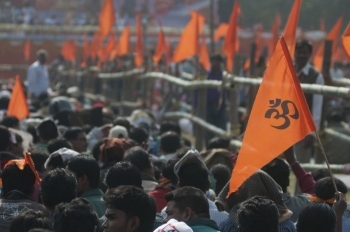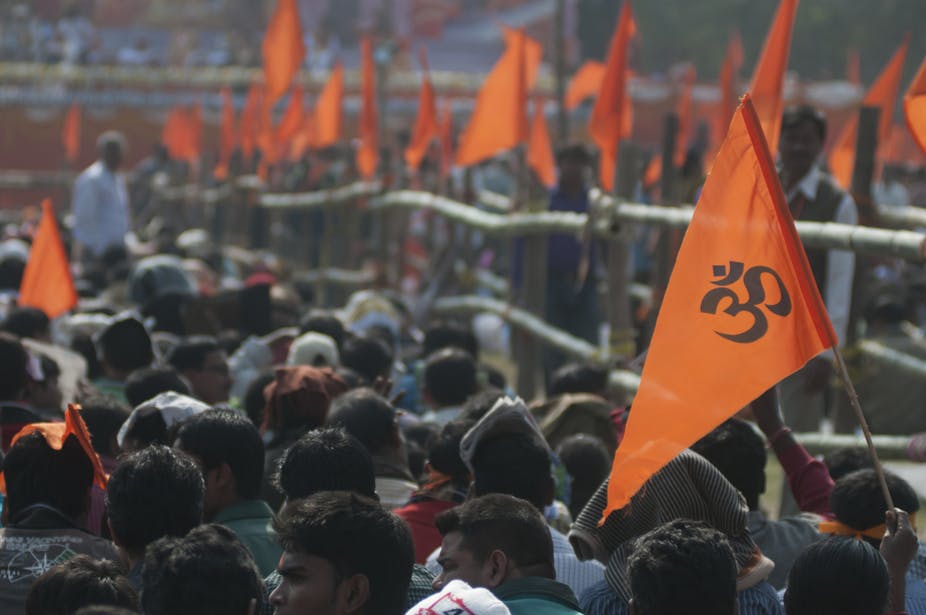
.jpg) Dr. James Regina C. Dabhi
Dr. James Regina C. Dabhi

After BJP’s coming to power at the Centre, India is referred to as "electoral autocracy" and a "populist democracy". Baba Saheb Ambedkar warned us on November 25, 1949, of the need to give up the grammar of anarchy, to avoid hero-worship, and to work towards a social – not just a political – democracy. Hero-worship for him was a sure way to the degradation of democratic institutions, and would eventually lead to dictatorship.
India has gone down this path and is witnessing it now more vulgarly than ever before. Populist leaders aren’t those who address the needs of the numerical majority; they address the needs of a well-knit elite minority whose interests are consolidated well enough to prevail over the divergent interests of the large majority population.
Undermining Democratic Processes
Hindutva uses hate campaign and narratives to distort history, manipulate religion, religious symbols, and arrogate historical characters. It has deployed “Hindu identity” to create a false sense of unity among Hindus, the BJP as their saviour and sole custodian of Hindu identity by portraying minorities, most conspicuously Muslims, as enemies of India. Hindutva justifies the means of muscle power, threats of fabricated cases, money and media to portray Hindus as benevolent idealists, and Muslims as barbarians.
The narrative hides social discrimination, inequality, unemployment, inflation, human rights, Dalit and gender violations, plight of migrants and covid crisis in India. Many of those made to feel part of the “Hindu fold” are, in fact, the most socio-politically and economically marginalised by the exploitative castes and classes of that very same fold. They use populist narratives and parliamentarian majority to bulldoze controversial Amendments and Bills (For example, Revoking Article 370, CAA, the Farm Bills, anti-conversion laws, FCRA) with minimum or no debate, subverting democratic processes.
The Congress Party has its role in communal and autocratic politics. The 1975-77 Emergency and the 1985 controversial Shah Bano lawsuit are cases in point. The Congress cannot wash its hands of 1984 violence against Sikhs. Despite communal politics, people have largely maintained a pluralist and secular democracy.
Many of us believed Amartya Sen (“Development as Freedom”) that the people of India have been able to sustain democracy amidst deep linguistic, caste, religious, and regional differences. Now the Hindu nationalism has twisted and distorted the precepts and practice of the Constitutional democracy to further its political dream of “one nation, one religion.” This has been achieved gradually through manipulating and circumventing constitutional institutions and processes.
Hate campaigns and violence
Savarkar’s idea of “one nation, one religion” has been kept alive by Hindutva organisations and political parties. The Babri Mosque demolition in 1992 helped this ideology gain validation and a prominent place in Indian politics. The Supreme Court verdict on it is seen as a victory for majoritarianism; many doubt the influence and infiltration of Hindutva in democratic institutions.
In the recent chronology of events beginning from Gujarat riots of 2002 where the role of the BJP political leadership and police was evident. Issues of conversion, ‘ghar vapsi’ (return to Hinduism), love jihad, the anti-reservation campaign and the Uniform Civil Code were kept alive across the country by various outfits of Hindutva. The BJP and the RSS instituted outreach programmes to entice Dalit and to prevent them from embracing other religions, though their core constituency remains exploitative/so called higher castes.
Between May 2015 and December 2018, at least 44 people (36 of them Muslims) were killed across 12 States. Over the same period, around 280 people were injured in over 100 different incidents across 20 States (Human Rights Watch defenders, 2019)
Shabari Kumbh Mela was held by the VHP in the Dangs district of Gujarat, where large Adivasi population had witnessed attacks by Hindutva goons. India’s tribal-majority districts have witnessed the bloodiest anti-Christian attacks in MP, Orissa and Gujarat. During “Black Christmas” of 2008, nine Christians were killed, over 90 churches, Christian institutions and over 700 Christian homes were burnt. Is this hue and cry about conversion, or a pretext because emancipated Adivasis pose a challenge to their domination and exploitation?
The present regime controls a large section of media to promote Hindutva agenda. The Belarusian political scientist, Vitali Silitski, said that the polluting political class spurs efforts to destroy the opposition’s organizational capabilities, silence independent media, undermine independent non-governmental organisations, and create surrogate institutions that make faking democracy and maintaining political process less risky. Louis Althusser argues the role of media and popular culture in the process of domination of the masses.
There are very few newspapers and magazines that dare to challenge the Hindutva government. Human rights activists, journalists, scholars, individuals, and women who are supporting the Constitutional democracy are trolled, threatened, jailed, raped and charged. Hindutva governance is averse to the Rule of Law. The protest against students wearing Hijab is the latest to stir communal divide for political agenda. Then US President Barack Obama in 2015 had urged the BJP government to uphold religious freedom.
Michael Foucault argued that exercise of power depends on the scaffold of knowledge that supports in order to advance the interests and power of certain groups while marginalizing others. Gramsci argued that to have a hold on the mind of people, it is vital that ideologues seize control of social and educational institutions, which are then used as vehicles to spread the dominant ideology and to maintain and consolidate power. The BJP’s concerted onslaught on liberal educational institutions, distorting curriculum, appointing Hindutva ideologues in these institutions prove the point these social scientists make.
Devaluation of Constitution
The fundamental ideals underpinning Indian democracy have been eroded through Hindutva ideology and narratives in pursuing a Hindu Rashtra and majoritarian rule. The acts of omission and commissions by the Hindutva regime has dishonoured our Constitutional principles and values of Equality, Fraternity, Justice and Secularism. The inclusive and people-centric development expected of a democratic government has been reduced to infrastructure expenditure, beautification, statues and publicity.
The democratic principles enshrined in the Constitution only come alive when it is lived by the people and exemplified by the elected representatives in the State Assemblies and Parliament. The ideal is far from reality in the majoritarianism which is inherently a violation of democratic values. The behaviour of members of the Assemblies and Parliament is mockery of representative democracy and election. Karnataka, Goa, MP and Rajasthan are cases in point.
When Covid-19 struck India, instead of reaching out to the migrants and suffering masses, the BJP used the health crisis as an opportunity to enhance of Modi’s personality cult. The electoral bonds and the PM-CARES funds are apparently pointing a finger at amassing wealth by BJP for non-transparent purposes.
Hope amidst hate
The ‘electoral majority’ of the BJP in the Parliament is based on about 37% of votes. There is a huge population which does not vote for BJP and its Hindutva political agenda. Some States have rejected BJP. People see that India cannot flourish and bloom with just one colour, the saffron colour. They salute the tri-coloured national flag and the diversity it represents. Arundhati Roy in a recent interview (https://www.youtube.com/watch?v=ACxkPzV6fLY) suggested that we are passing through a tunnel of Hindutva fascism but it will end.
India’s shambolic economy, record unemployment, human rights violation, violation against women, increasing inequality between the rich and the large population, and vanished livelihoods question the Hindutva divisiveness. The waste of resources on advertisements for personality cult, extravagant vanity projects and policies favouring primarily the corporate at the cost of the ordinary citizens will not go unnoticed.
Foucault argued, where there is power there are also ‘sites of resistance’. Citizens, some universities and civil society organisations continue to create sites of resistance that hold out the promise for a reconfiguring of power relations that might redress oppressive laws, policies and practices. The call for azadi (freedom) continues to challenge the present regime and their “one nation, one religion” theory subverting the Constitutional, secular fabric of India. The government’s attempts to crush these voices in anti-CAA and farmers protests have met with strong resistance and setback. Democracy can be trampled upon but not crushed.
Populist leaders are dictators and megalomaniac and have been rejected all over the world. I believe Indians love democracy and no one can take it away from them. My prayer is Tagore’s words: “Into that heaven of freedom my father/mother (my addition), let my country awake”.
(The writer is director, Centre for Culture and Development, Xavier Technical Institute Campus, Sevasi-VADODARA, Gujarat; jimmydabhi@gmail.com)